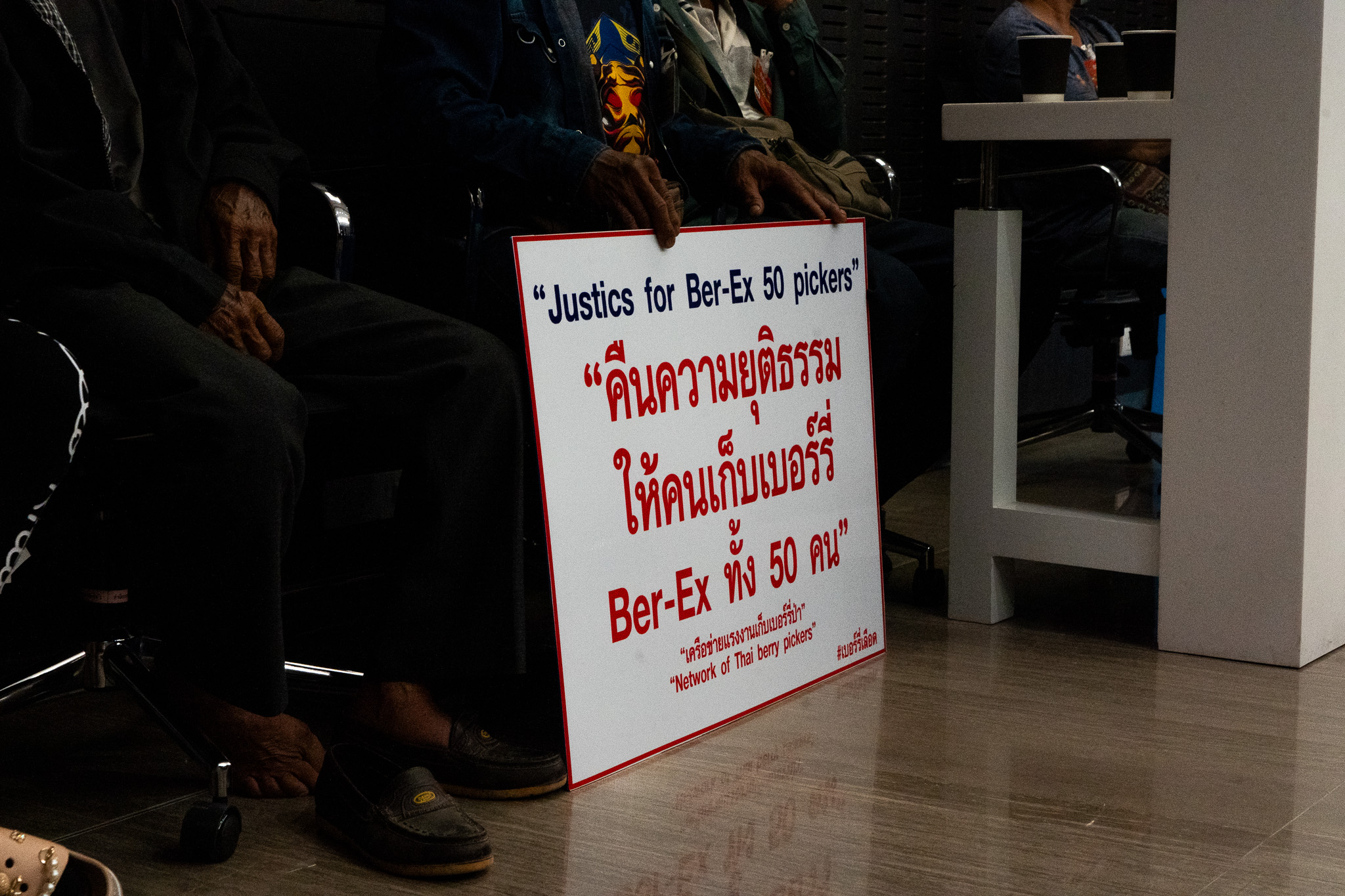Would you buy yogurt drink from a teen selling it at an intersection because they were wearing a school uniform? Yogurt drink dealers across Isaan train teenagers who are no longer students to dress up in a school uniform to increase sales. Do people passing by tend to buy out of pity?
By Wipawee Chunsamruan
It’s a scorching afternoon. Drivers are hurrying to beat the light. Three, two, one – the traffic comes to a full stop.
Their moment has come again. The hawker quickly fans out among the vehicles. Touting their wares and among them; one can be heard in particular.
“Hello! Yogurt drinks! Would you like some yogurt drinks?” shouts 19-year-old “Kong,” making a deep, exaggerated bow to each car. He does this in hopes of selling all his yogurt drinks by the end of the day.
Kong is always accompanied by his trusty light blue tote bag and his dark blue cooler that keeps his yogurt drinks cold. His goal today like every other day: to sell 39 packs of yogurt drink before sundown.
Kong tries to cheer himself with a forced smile but it’s clear he’s disappointed.
“I’d hoped to sell them all today, but I only managed to sell four packs,” he says.
Kong has a lot of energy. He has to if he hopes to finish his task of selling 35 more packs before sunset.

Beginning life on the road
He started as a trainee in the yogurt drink business, making a paltry 50 baht a day. But then he was persuaded to hawk yogurt drinks at intersections. When starting, his supervisor, without explanation, told him to wear a student uniform. Told him to wear the uniform though he was no longer a student.
Kong gives the following reason for his work choice: “I only want to make enough money to support my family.”
“I can earn between 300 to 400 baht a day. If I can’t sell enough that day, I’ll wait until nightfall or whenever the team manager comes to collect what’s left over,” he says.
Kong’s job is no picnic. Day after day, he must endure the blazing sun or pouring rain, all in an effort to hawk his drinks to passing customers. It’s not the easiest or most comfortable way to make a living, but Kong soldiers on, determined to make ends meet.
He dreams of a future in which he can save up enough funds to return to school.
Education “too expensive”
Despite graduating from high school, Kong’s dream of going to university remains unfulfilled due to his family’s limited income, which barely covers expenses.
“I dream of becoming a teacher who can take care of kids and give them a chance to attend a good school and get an education,” he says “My goal is to earn a monthly salary and major in education so that I can teach and help kids who don’t have many opportunities to learn.”
With a tone of defeat, Kong revealed, “The cost of tuition fees per semester is around 3,000 to 4,000 baht, which is too expensive for my family. Sadly, we can’t afford it.”
Despite having completed high school, Kong’s inability to pursue further education has left him lagging behind. As a result, he finds himself still wearing his old high school uniform while working.




Playing the pity card
While wearing a school uniform may boost the income of hawkers working at traffic intersections, it can also evoke conflicting emotions from passersby.
“A school uniform is actually more of a façade. If you’re really just selling goods to support your family, why not wear regular clothes?” asks Suwatchara Seubrasee, a student at Maha Sarakham University who often sees kids selling yogurt drinks at traffic lights. “Seeing children in school uniforms selling things makes people uncomfortable. I don’t find it appealing at all.”
Srisurassawee Pimsim, a student at the same university, argues that these young vendors should be provided with their own distinctive uniform instead of manipulating people’s emotions. She adds that sometimes people buy their products out of pity even if they don’t really want them.
Another student, Punnapop Charoenpongsakorn, takes a different tack. He believes that a young person having to wear a school uniform to sell goods is a clear indication of the government’s failure to provide equal benefits to all citizens. In his opinion, if the country were truly prosperous, children would not have to sacrifice their education to earn money in this way. This practice, he says, should not even exist in the first place.
A question of child labor?
Although Kong is not a child, his example touches on the issue of child labor. “Making a living should not be a burden on children,” says Ticha Na Nakorn, director of Ban Kanchanapisek Juvenile Vocational Training Center in Nakhon Pathom. She argues that children deserve to have a childhood without being forced to work beyond their limits: “While they can work to some extent, there should be a limit to it.”
“Where are the responsible adults?,” she asks. “Teaching should involve careful planning to provide children with meaningful life experiences. They should be compensated and their safety should be ensured. However, selling things at a busy intersection does not provide them with life experiences. It is neglectful and they deserve better care.”

Company instructions?
According to an Isaan sales representative, a yogurt drink company typically pays commissions to their sales representatives, regardless of whether they work full-time or part-time. The company charges 100 baht for each pack of yogurt and pays a commission of 20 baht. A corporate representative from the company gets in touch with the sales representatives after receiving their contact details.
When asked about instructing hawkers to wear school uniforms, the company representative (who asked his name not be used) declined to answer and promptly ended the phone call.
“I’m also curious,” says Kong, “why they ask me to wear a school uniform. Why can’t I wear something else?”
Kong does admit that when he wears the school uniform, he is likely to be paid between 600-700 baht a day. The uniform attracts customers, he says, making him a walking billboard for his products and generating sales.
Kong has discovered that the company advises its young hawkers to wear a school uniform while on the job, as without it, they are unlikely to make any significant sales. The uniform, it seems, plays a crucial role in attracting customers and boosting sales, making it a key component of the company’s marketing strategy.
Insecure and vulnerable
Kong faces many challenges on the streets, including competing with other hawkers for prime selling spots and enduring the blazing sun.
“I’ve been chased away by the police, too,” Kong says with a frown. “I don’t understand what I’m doing wrong because other street hawkers are still selling their goods on the street.”
They sell everything from rice crackers to flower garlands and flowers. “I’m the only one who seems to be getting into trouble,” he adds with a hint of frustration in his voice.
He recalls telling a policeman once, “Please don’t make me leave.” The police and other locals had prohibited him from using the area. He’d responded: “Let a kid make some money, too.”
Nevertheless, a police officer explains it’s unlawful to sell on the streets.
“It is against the law to sell or buy goods on the street. The maximum fine for buyers is 2,000 baht while the maximum fine for sellers is 5,000 baht,” says Lance Corporal Siriwat Paidee of Nong Khai’s Fao Rai police station. “You cannot sell in public areas or on the road.”
Selling products on an open road is a violation according to the Land Transport Act of 1979, which imposes a maximum of 500 baht fine. A punishment of up to 2,000 baht can be imposed for violating the Maintenance of the Cleanliness and Orderliness of the Country Act of 1992.
Out of options but persevering
“I’m exhausted,” sighs Kong heavily, looking depressed. The sun is setting. “Sometimes I get disappointed.” Despite the odds and limited options, Kong persists and moves forward, determined to do his best to make a living.
He just wants to sit down and have a chance to catch his breath. He’s exhausted. But he carries on, with a smile on his face, knowing how his family members depend on him.
Kong does sometimes experience moments of unexplainable joy as he counts the banknotes that fall into his hands.
But the odds are not always in his favor. Today, he’s unable to sell all 39 of the yogurt drink packets as he had hoped.
“Hello! Yogurt drinks. Would you like some yogurt drinks?” shouts Kong as he bows yet again and again in front of every car after car.
“Ugh! I’m so tired. I don’t want to sell anymore.” On days when the workload is heavy, Kong can’t help but complain. But despite the challenges, he pushes forward, encouraging himself to keep smiling and bowing. He carries on, knowing that there is always a tomorrow to face.
There are days when he becomes totally worn out. After that, he tells himself:
“Let’s go home and get some rest. I will start fresh tomorrow.”
Guest edited by Natticha Nasee and Aritsara Phanchanda
Read in Thai version here
Wipawee Chunsamruan studies in the Faculty of Informatics at Mahasarakham University and is a participant in the Journalism that Builds Bridges project funded by the embassies of Finland, the Netherlands, and New Zealand, as well as UNESCO and UNDP.





